Image
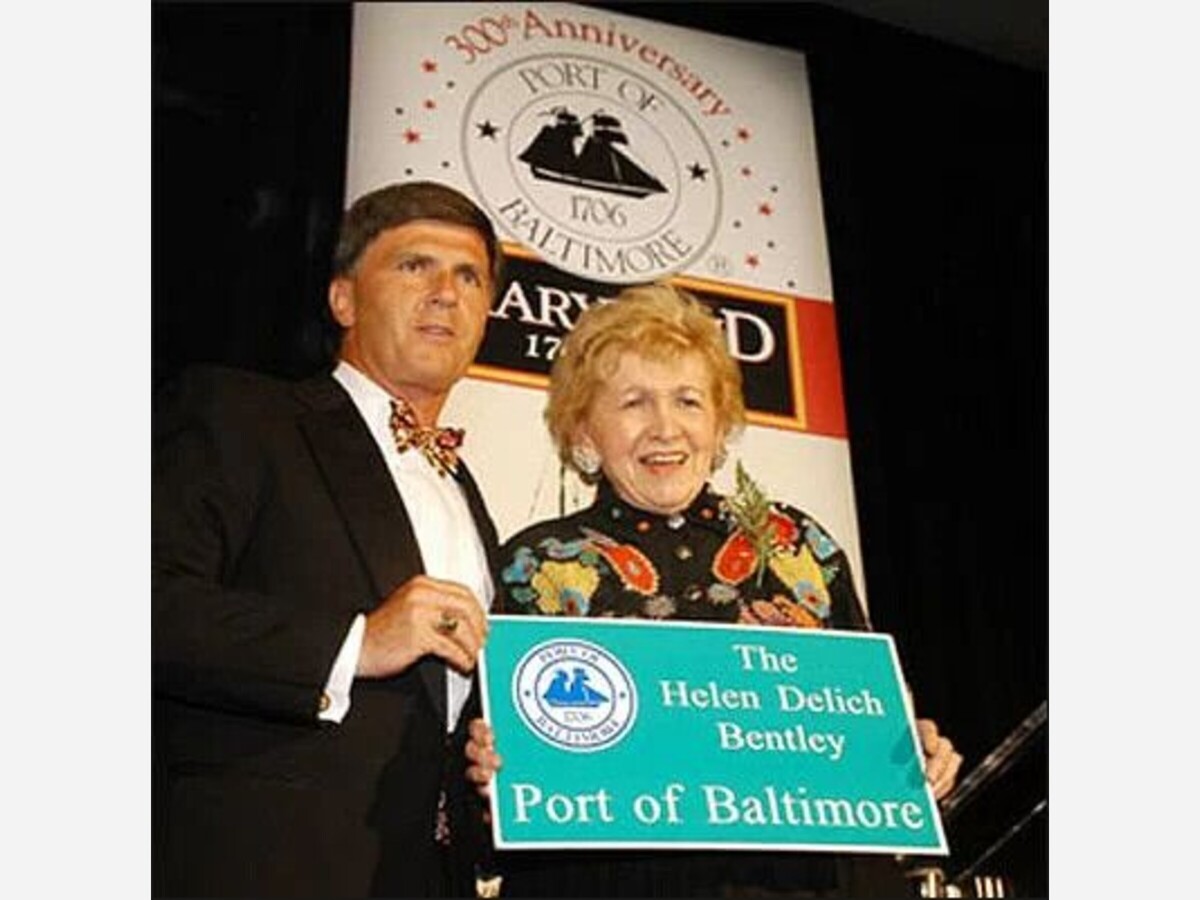
Baltimore's port is named after Helen Delich Bentley. I was her press secretary for a time after she won her seat in Congress. The Godmother of the Port, she was a Timonium resident who is forever remembered for her contributions. What would she think of the Francis Scott Key Bridge--one of her "projects"-- disaster on the local and world economies?
 photo: ABC News
photo: ABC NewsAnd, where would the Port of Baltimore be without her? For a stunning 70 years she fought hard in every way imaginable to promote Maryland’s biggest and most important economic engine. She passed in 2016. In 2004, Bentley was inducted into the International Maritime Hall of Fame. In 2006, as part of the port of Baltimore's 300th anniversary celebrations, the port was renamed the Helen Delich Bentley Port of Baltimore.
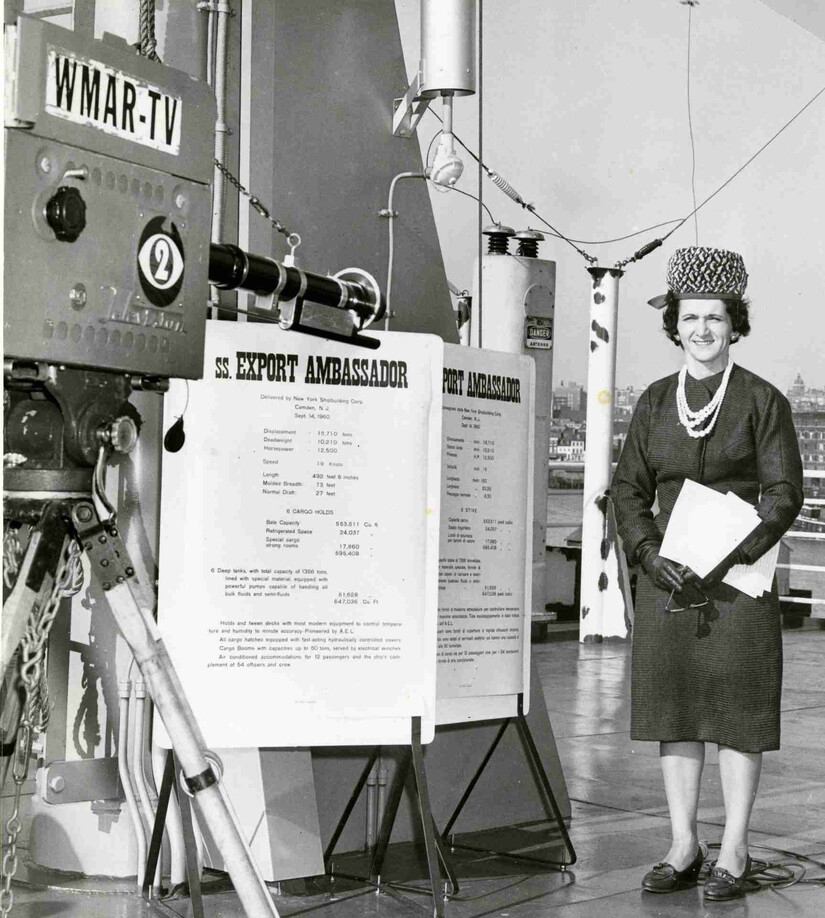 photo: WMAR-TV
photo: WMAR-TVBeginning in 1950 Bentley hosted a local Baltimore TV program on WMAR, The Port That Built a City, presenting maritime and transportation-related news. Later retitled The Port That Built a City and State, the series was produced by Bentley until 1965 and included then-novel live remotes from the decks of ships in Baltimore harbor during the early years of television.
In 1969, Bentley was offered a seat on the Federal Maritime Commission. However, she declined and asked for the position of chair instead. She was appointed and chaired the commission from 1969 to 1975. The position made her the highest-ranking woman in President Nixon's administration. During her tenure, Bentley advocated for federal support for American shipbuilding yards.
Bentley challenged Democratic incumbent Clarence Long in Maryland's 2nd congressional district in 1980 and 1982. She defeated Long on her third attempt in 1984, and was elected to the 99th Congress and to the four succeeding Congresses, serving from January 3, 1985, to January 3, 1995.
During her time in office, Bentley was a strong advocate for protectionist trade policies in support of U.S. manufacturing and the U.S. Merchant Marine fleet. She also introduced legislation which enabled the Chesapeake Bay to be dredged, allowing larger cargo ships to access the port of Baltimore. In the 1990s, she was sympathetic towards Serbians during the civil war in Yugoslavia, and opposed U.S. military involvement in that conflict.
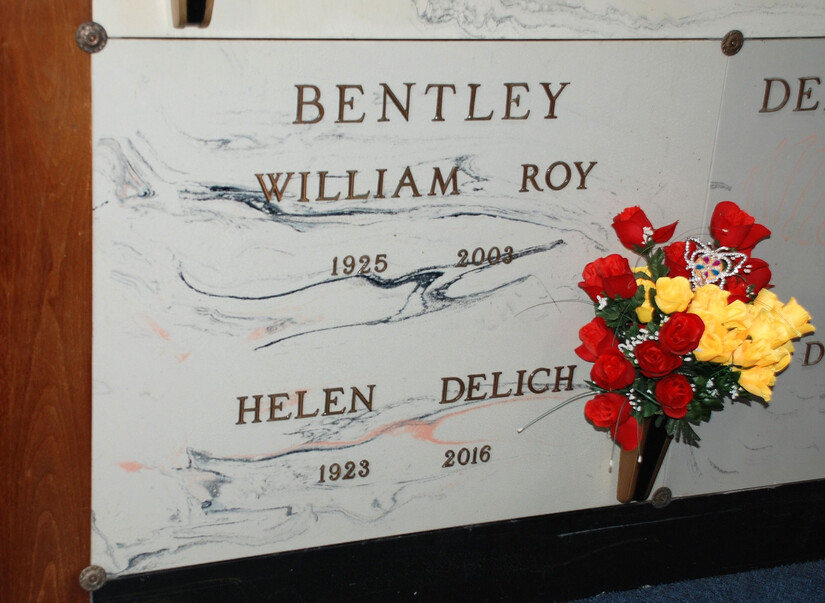 Dulaney Valley Memorial Gardens
Dulaney Valley Memorial GardensShe is the subject of local museums:
Former Congresswoman, Museum Trustee, Champion of American Fashion (Baltimore Museum of Industry) and benefactor of the BMI.
Known as much for being stylish as she was for her groundbreaking career as a maritime reporter and elected official, U.S. Congresswoman Helen Delich Bentley wore garments that reflected her civic pride in supporting American designers. Much like her advocacy on behalf of the port, Bentley’s support for American designers demonstrated her lifelong belief in the importance of local manufacturing and commerce.
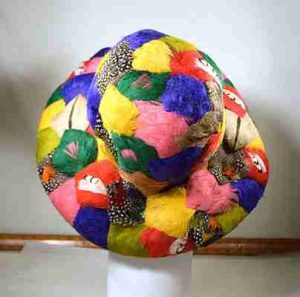

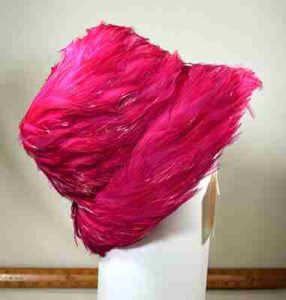
Inspired by her immigrant mother’s journey to America onboard a German steamship, Bentley arrived in Baltimore from her native Nevada in 1945 and quickly made a name for herself reporting on the city’s maritime industries for The Baltimore Sun. Bentley’s syndicated column, “Around the Waterfront,” drew on a wide range of sources—she was as comfortable around longshoremen and union officials as she was with shipping executives and politicians—and frequently broke stories involving the Port of Baltimore and its competitors throughout the nation.
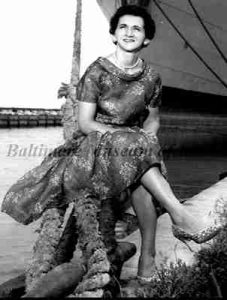
Named the Sun’s first female maritime editor in 1949, Bentley’s growing expertise led her to become the host and producer of WMAR-TV’s popular series “The Port That Built a City and State” in 1950. For fifteen years, until 1965, Bentley used this televised platform to lead the charge to put the aging Port of Baltimore under the modern control of the Maryland Port Authority, and to showcase an amazing collection of custom-made dresses and hats, many of which were donated to the BMI upon her death. The same civic pride that informed Bentley’s waterfront reporting and fashion choices also eventually guided her into public service. In 1969, President Richard Nixon appointed Bentley Chair of the Federal Maritime Commission, making her the highest ranking woman in the Executive Branch. During her six years leading the Commission, Bentley was a strong proponent for improvements to the nation’s aging merchant fleet.
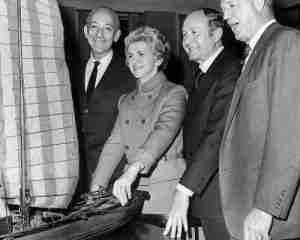
Following stints as a magazine columnist and shipping company executive, Bentley then turned her sights on Congress and was elected to represent Maryland’s 2 nd District in 1984. During her five terms, the Republican congresswoman worked tirelessly on shipping and trade issues, and secured millions of dollars to improve the Port of Baltimore. Bentley also backed numerous “Buy American” campaigns and could often be found driving across her district in an American-made station wagon bearing a “BUY USA” license plate.

Though Bentley retired from public office in 1995 following a failed bid for Maryland governor, she continued to advocate on behalf of Baltimore’s maritime interests as a consultant right up until her death.
Coupled with a close association to BMI founder Mayor William Donald Schaefer, Bentley’s lifelong interest in promoting Baltimore’s industrial heritage made her a natural advocate for the BMI. In 2003, she joined the museum’s Board of Trustees and quickly became one of its most active members.
During her time as a Trustee, Bentley’s contributions to the BMI were numerous and included chairing multiple Board committees, skillfully guiding the museum through the transition between executive directors, and tirelessly promoting the museum amongst Maryland’s most powerful economic and political leaders. She remained an active trustee until her death in 2016.
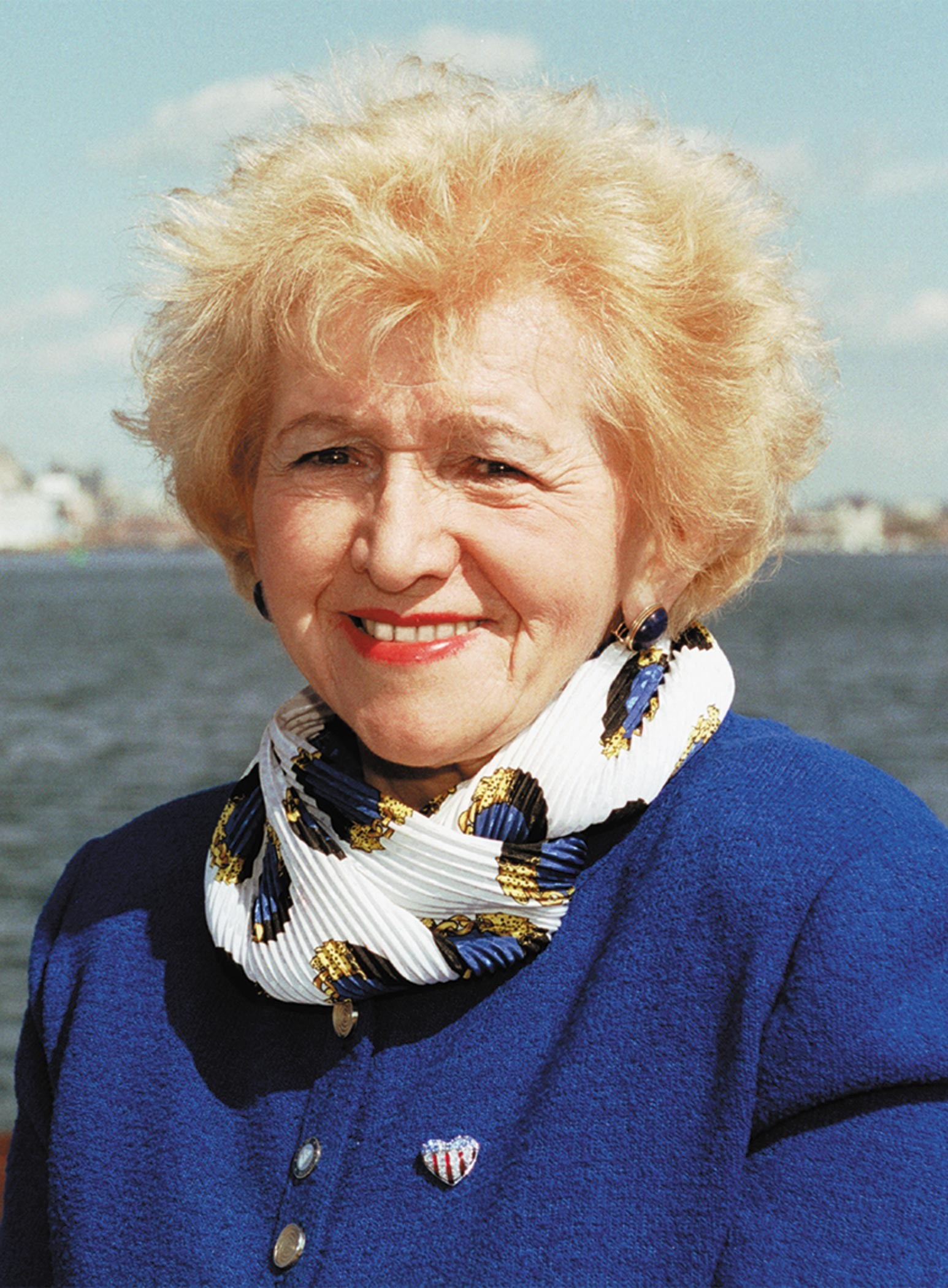
A large scale project is now underway to preserve, catalog, and rehouse her extensive film collection, bequeathed to the BMI by Ms. Bentley. This initiative is made possible by a grant from the Institute of Museum and Library Sciences (IMLS) through the Museums for America program. This prestigious and competitive award, along with a generous bequest from Bentley’s estate, provides funding for the fragile 16mm acetate films to be preserved in a digital format. Once the project is completed in late 2021, film clips and scripts from the show will be accessible through the museum’s online catalog, helping to ensure their historic integrity and accessibility for generations to come.
“This project will allow us to have better physical and intellectual control over this catalog, arguably among the most important records of maritime history in the nation,” says BMI archivist and project director Matt Shirko. Henninger Media Services in Arlington, Virginia, a firm specializing in the preservation of motion pictures, has been selected by Shirko and his team to handle the digitization work.
The Maryland Museum of History and Culture is displaying some of her fashion as a part of an exhibit for Women's History Month.
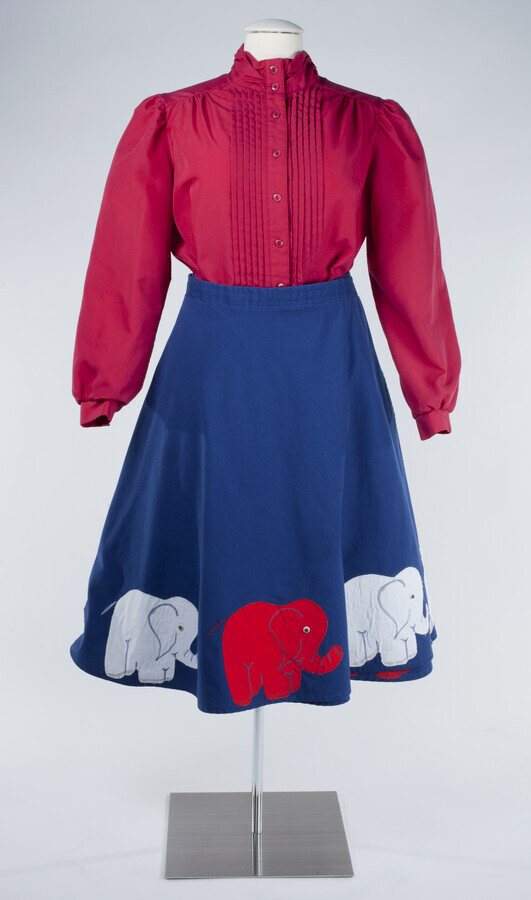
Ensemble comprised of a red blouse (2015.20.9) with full-length sleeves, high collar, and pin-tuck detail, and a blue, mid-length elephant campaign skirt (2015.20.8). Worn by former Maryland State Representative, Helen Delich Bentley when campaigning for her position in the mid 1980s.
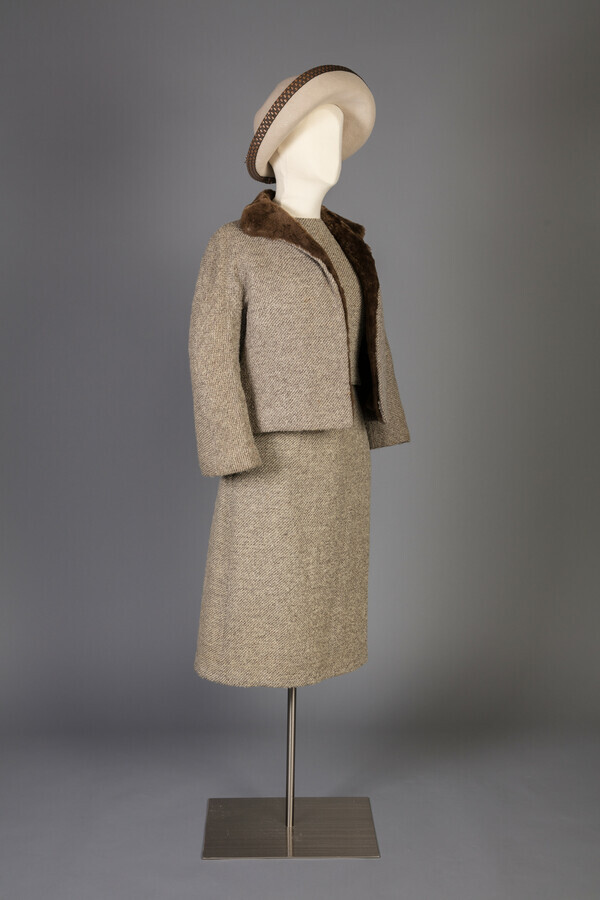
Three piece wool suit and matching hat worn by Helen Delich Bentley (1923-2016). Bentley’s career as a journalist began in 1948 as a young reporter for the Baltimore Sun. Unlike most women reporters who were restricted to the society pages, Bentley’s beat was the waterfront. She created the nation’s most respected maritime news section, breaking important local and national stories. In the 1950s, she branched into television with the series The Port That Built a City.
For this program, Bentley acted as producer, director, editor, writer, and interviewer, all the while still editing and reporting for the Sun. Along with her penchant for journalism, Bentley also ran a successful political career and served as the Federal Maritime Commission’s chair from 1969 to 1975 and as a Maryland congresswoman from 1985 to 1995. A well-known face in Baltimore news, she was also known for her personal style, including her hats, which were featured in a profile on Bentley in the 1950s.
Today her legacy lives on in commerce, journalism, public service, and style. We miss you Helen Bentley.